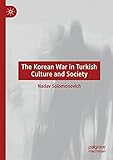The Korean War in Turkish culture and society [electronic resource] / Nadav Solomonovich
Material type: TextPublisher: Cham, Switzerland : Palgrave Macmillan, 2021Description: 1 online resourceContent type: text Media type: online resource Carrier type: computerISBN: 9783030840365; 9783030840358; 9783030840389Subject(s): Korean War, 1950-1953 -- Participation, Turkish | Korean War, 1950-1953 -- Social aspects -- TurkeyGenre/Form: Electronic books.LOC classification: DS919.4 | .S64 2021Online resources: Available from eBook Collection (EBSCOhost), Limited User Access (1 Copies Available) An electronic book accessible through the world wide web; click for information.
TextPublisher: Cham, Switzerland : Palgrave Macmillan, 2021Description: 1 online resourceContent type: text Media type: online resource Carrier type: computerISBN: 9783030840365; 9783030840358; 9783030840389Subject(s): Korean War, 1950-1953 -- Participation, Turkish | Korean War, 1950-1953 -- Social aspects -- TurkeyGenre/Form: Electronic books.LOC classification: DS919.4 | .S64 2021Online resources: Available from eBook Collection (EBSCOhost), Limited User Access (1 Copies Available) An electronic book accessible through the world wide web; click for information. | Item type | Current library | Call number | Status | Date due | Barcode |
|---|---|---|---|---|---|
 Books
Books
|
The BIAA David H. French Library Shelf 65 - Reading Room | H2p SOLOM 32923 | Not for loan | BOOKS-000000027038 |
Includes bibliographical references and index.
Chapter 1. Introduction -- Chapter 2. The Wars Reception -- Chapter 3. Islam as a Spiritual Weapon? Religion in Public Discourse and the Turkish Military during the Korean War -- Chapter 4. Literary Representations of War The Korean War in Contemporary Turkish Literature -- Chapter 5. Seeing War The Visual Representations of the Korean War in Turkish Media -- Chapter 6. Soldiers Personal Narratives of War The War in Memoirs -- 7. Conclusion: Remembering and Forgetting the War.
This book explores the important role that the Korean War played in Turkish culture and society in the 1950s. Despite the fact that fewer than 15,000 Turkish soldiers served in the war, this study shows that the Turkish public was exposed to the war in an unprecedented manner, considering the relatively small size of the countrys military contribution. It examines how the Turkish people understood the war and its causes, how propaganda was used to sell the war to the public, including the use of religious propaganda in the public sphere, and the impact of these messages on the Turkish public. Drawing on literary and visual sources, including archival documents, newspapers, protocols of parliamentary sessions, books, poems, plays, memoirs, cartoons and films, the book shows how the propaganda employed by the state and other influential civic groups in Turkey aimed to shape public opinion regarding the Korean War. It explores why this mattered to Turkish politicians, viewing this as instrumental in achieving the countrys admission to NATO, and why it mattered to Turkish people more widely, seeing instead a war in the name of universal ideas of freedom, humanity and justice, and comparing the Turkish case to other states that participated in the war. Nadav Solomonovich is a Research Fellow at the University of Haifa, Israel, having previously studied Islamic and Middle eastern Studies at the Hebrew University of Jerusalem. He is the author of several articles on modern Turkey and late Ottoman Palestine.
